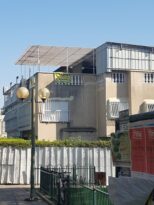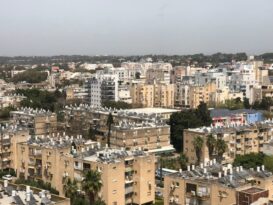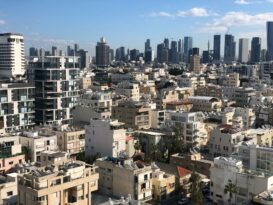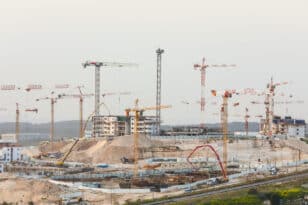Covid-19 has caused a sharp decline in the number of cross-border transactions for the purchase of apartments in Israel by foreign residents around the world. There was a 60% decrease in the number of apartment purchases in Israel compared to both the first quarter of 2020 and the second quarter of 2019, and a 27% drop in purchases made by the general public in the corresponding quarter last year. However, despite these statistics – the latest housing price index indicates a 1% increase in housing prices.
The Covid-19 crisis has led to a historic low in apartment purchases in Israel by “foreign residents” – referring to buyers whose life is based mainly outside of Israel. This information emerges from an analysis of data from Israel’s residential real estate industry in the second quarter, published this week by the Ministry of Finance.
Q2 2020: Foreign residents made only 122 apartment purchases in Israel
According to the data on Israel real estate, over the course of the second quarter or 2020, there were only 122 non-residents apartment purchases in Israel – the lowest figure since the State of Israel began monitoring the number of foreign residents’ transactions in Israel approximately two decades ago. When compared to both the first quarter of 2020 and the second quarter of 2019, there was a 60% drop in the number of transactions. “It is likely that this drop in purchases by foreign residents is largely due to technical difficulties related to the entrance of foreigners to Israel. However, given the fact that in many transactions of this type, the buyer enlists the aid of a local representative, both in locating the property and carrying out the transaction, this is not the sole explanation,” stated the document.
“Moderate” decline in sale of homes in Jerusalem
Geographic segmentation revealed that the decrease in apartment purchases in Israel by non-residents applied to all regions of the country, however, the rate of decline in the Jerusalem area was most moderate, with “only” a 43% drop compared to the corresponding quarter in 2019. On the other hand, in the Tel Aviv region, where there was already a drop of 40% in the number of purchases by foreign residents in the first quarter, there was a further decline of 56% in the second quarter.
According to the document, there is one significant difference between the property purchases by foreign residents in Jerusalem and Tel Aviv. For 40% of foreign buyers in Tel Aviv in the last two years, this was not their first apartment purchase in Israel, compared to only 20% in Jerusalem. According to the authors of the document, “This finding may hint to the motive behind the purchase, in the sense that the more properties that a non-resident acquires, the more likely that they were purchased for investment purposes as opposed to purchased prior to immigration to Israel (for living in).”
Historic low in Israel’s residential real estate market
The low numbers of purchases by non-residents were consistent with the data presented in the rest of the report, which indicated a historic low in Israel’s residential real estate market activities as a whole. Total transactions in the free market amounted to 16,800 transactions, a decrease of 27% when compared to the corresponding quarter last year. When compared to the first quarter, of which only March was affected by the Covid-19 pandemic, there was a 25% decline.
In total, the number of transactions, including those made with government subsidies through the Buyer’s Price initiative (Mechir Lemishtaken), amounted to 19,500 apartments, the lowest since the last quarter of 2011. Geographic segmentation showed that there was a decline in purchases in all regions of the country, but more prominent in the high-demand areas of Central Israel, and to a lesser extent in the peripheral areas.
Sharpest decline in apartment purchases in Israel was among investors
When divided by types of buyers, the sharpest decline was found among those who purchase apartments for investment purposes, when compared to the corresponding quarter in 2019, standing at 32%. Among housing developers, there was a decrease of 28%, while among those buying their first apartment there was the most moderate drop in purchases, at a rate of 24%. This is a surprising figure, considering that the young population in Israel (25-34 years old) has been the most severely impacted by unemployment as a result of Covid-19.
Opportunities for serious buyers that haven’t been seen in years
But along with the market stagnation, attractive opportunities may arise for those seeking to make apartment purchases in Israel these days. According to the analysis, due to the economic crisis, a large number of sellers are eager to sell their apartments, and even willing to do so at a loss. Approximately 3,900 apartments were sold by investors during the second quarter, and, on average, the capital gains (proceeds of the sale in relation to the price at which they purchased the property), was 344,000 shekels. This is 28% lower than the average capital gains of investors who sold their apartments in the corresponding quarter in 2019.
In addition, no less than 14% of the apartments sold by investors during this period (approximately 550 apartments) were sold at a loss. This is a significant escalation compared to the first quarter of 2020 where 10% of investors’ apartments were sold at a loss, as well as the second half of 2019 where only 7.4% were sold at a loss only. This phenomenon was particularly pronounced in the area of the southern city of Be’er Sheva, which is popular with investors, where 20% of all apartments sold, were sold at a loss.







